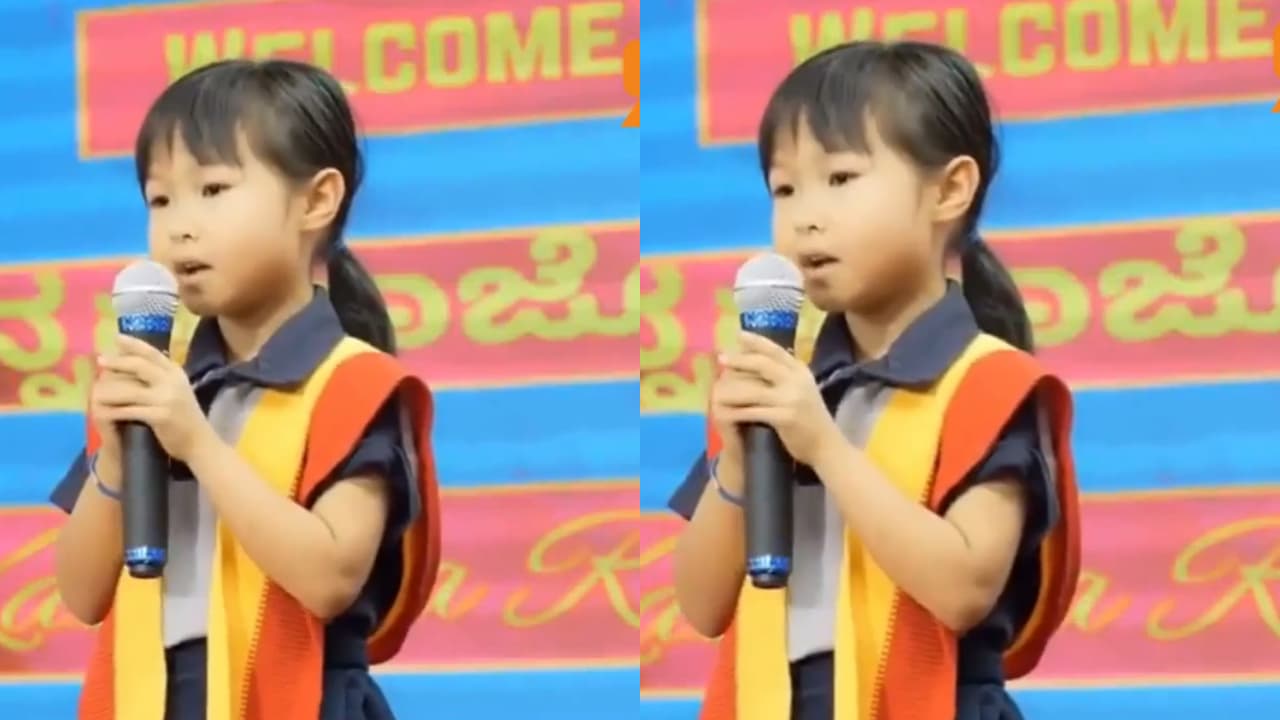A Japanese Grade 1 student astonishes Bengaluru by speaking fluent Kannada during Rajyotsava. Her pronunciation, grammar, and conversational skills impress teachers and locals, sparking social media discussions about language learning.
Bengaluru: In a heartwarming display of dedication and respect for local culture, 7-year-old Konatsu Hasegawa, a Grade 1 student from Japan at Trio World Academy, left everyone astounded with her flawless Kannada during the Rajyotsava celebration. Choosing Kannada as her second language, Konatsu’s pronunciation, grammar, and conversational skills impressed teachers, students, and Kannadigas alike. Her performance has sparked widespread admiration on social media, highlighting how children and adults from other countries often put in significant effort to learn the local language.
Children vs Adults: Who Learns Languages Better?
According to research, while children are often perceived as superior second-language learners due to their ability to achieve native-like proficiency, adults also have significant advantages. Studies show that adults tend to learn more quickly during the initial stages of language acquisition, particularly in classroom or structured settings, whereas children benefit from long-term immersion environments. Children generally excel in phonology and grammar if learning begins before puberty, giving them an edge in pronunciation and sentence structure.
Adults, however, can acquire grammar effectively in structured settings and often learn vocabulary faster over short periods, especially when they have frequent interaction with native speakers. In terms of pragmatics, or the social use of language, adults hold an advantage due to their developed theory of mind, which allows them to interpret intentions and context more accurately. Both children and adults experience changes in brain structure when learning a new language, although these changes are often more pronounced in children.
How did the Social Media React?
Konatsu’s impressive Kannada fluency has prompted lively discussions online, with many users comparing her abilities to long-term residents of Bengaluru:
One user commented: “Hope the kids of these 10+ years living here have learnt or know how to converse in Kannada.”
Another remarked: “Fact is people living here for 10 plus years are probably adults making ends meet. They have more important issues to handle at their jobs and homes. So learning Kannada is probably very low on their list. Though all languages and cultures deserve to be respected equally, including Kannada… And calling people from other states ‘migrants’; please try to understand the meaning and implications of a migrant.”
A third user noted: “It takes 20 hours collectively to learn decent Kannada to speak with locals. If you claim they can’t take out 20 hours in 10 years, that’s a ridiculous claim. They just don’t bother.”
Another comment added: “It’s easy to reason out. For example, if any Kannada person moves to a northern state and stays, they will pick up the local language to start interacting with people around them. We expect anyone coming here to start conversing in Kannada. It’s a fair expectation from us locals. You don’t lose anything by learning Kannada.”
Yet another user wrote: “Where there is a will, there is a way, guys. People saying they are too busy and that it’s easier to learn as a kid… all I say is, I learnt Japanese as an adult (certified speaker). I am now also learning Malayalam from colleagues. I learnt Hindi and English in school, learnt Telugu through family and movies… Mother tongue is KANNADA.”
Dedication and Respect Highlight Importance of Learning Local Languages
Konatsu Hasegawa’s achievement demonstrates that respect, dedication, and consistent effort can help anyone, child or adult, master a new language. Her fluency in Kannada is a reminder that learning a local language not only preserves culture but also fosters mutual respect between communities. The enthusiastic reactions on social media underline the broader conversation about language learning, integration, and cultural appreciation in Bengaluru.
